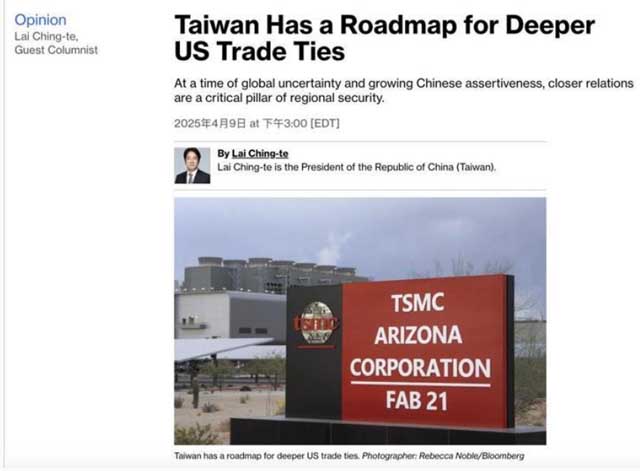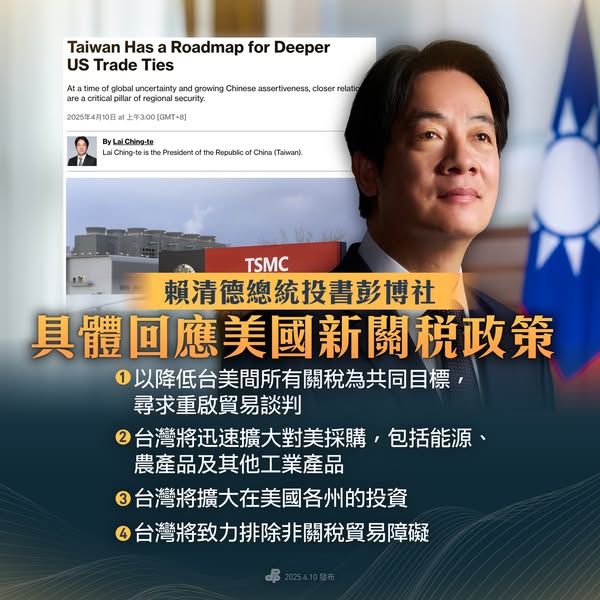賴清德總統9日投書彭博新聞社(Bloomberg News),對美國總統川普的對等關稅政策提出4點應對,包括台美零關稅、增加美國進口和軍購、增加對美投資,以及承諾取消所有非關稅貿易障礙;賴清德總統表示,台灣有信心,台美之間的經濟和安全利益不但將克服國際貿易環境的亂流,也將定義印太地區的未來。

五個重點如下 :
(1)賴總統說,台灣作為仰賴貿易的經濟體,台灣長期的成功是建立在公平、對等和互惠的貿易關係上,並稱鼓勵台灣企業擴大國際足跡,尤其是到美國,是台灣策略非常重要的一環;這也包括深化台灣與美國企業之間的商業關係。
(2)賴總統說,台灣面對川普對等關稅政策的核心原則,包括以消除所有關稅為目標,重啟台美貿易談判;賴總統說,台灣已有相對低的關稅稅率,但台灣願意在對等的基礎上,砍至零關稅。
(3)賴總統說,台灣將快速跨大採購美國產品,包括能源、農業和其他美國製造業產品,以縮小台美之間的貿易不平衡;賴總統也說,台灣將增加對美軍購。
(4)賴總統指出,台灣將增加對美投資,並成立跨部會的「美國投資小組」來支持雙邊貿易和投資,以期川普政府會做出對等的努力。
(5)最後,賴總統說,台灣將承諾消除所有非關稅障礙;台灣將採取具體的步驟來解決台美之間長期阻礙貿易談判的議題;台灣也會回應美國所擔憂的出口控制和不當從台灣轉運的低價產品。
投書原文
深化台美經貿關係的路徑圖
A Roadmap for Deeper Taiwan-U.S. Trade Ties
By Lai Ching-te
在全球局勢不穩與中國日益強勢的情況下,台美關係的深化是區域安全的重要支柱。
上個月,台灣新購的66架F-16V戰機中的首架,於南卡羅來納州格林維爾正式下線。這筆在美國前總統川普任內簽署、價值80億美元的軍售案,不僅展現了美國在先進製造領域的創新與領導力,也在經濟上創造了數千個高薪就業機會,鞏固了印太地區和平與穩定的基礎。
這筆軍售案象徵著台美雙方緊密的共同利益。我們的夥伴關係建立在對自由與民主的堅定信念之上。數十年來,台美兩國經濟體攜手合作,共同遏止共產主義擴張。即使北京加強對我周邊的空軍與海軍軍演,我們依然堅定不移。台灣將永遠是本區域民主與和平的堡壘。
這項夥伴關係不僅限於安全層面。台灣雖然僅有2,300萬人口,近年來卻成為美國重要的投資者。台積電(TSMC)近期宣布,將把對美國的總投資提高至1,650億美元,此舉將創造4萬個建築相關職缺,以及數萬個半導體製造與研發的高科技職位,進一步促成亞利桑那州新興科技聚落的崛起。
台灣致力於在製造與創新領域強化雙邊合作。作為一個高度依賴貿易的經濟體,我們的長期成功仰賴公平、互惠且具互利性的貿易關係。我們鼓勵台灣企業擴展全球足跡,尤其是深入美國市場,這是我們戰略的核心之一。加深台美企業之間的商業連結,也是推動此策略的關鍵。
這些核心原則也將指引我們回應川普總統提出的對等關稅政策。
首先,我們將尋求重啟雙邊貿易談判,目標是逐步降低台美間的所有關稅。目前台灣的平均名目關稅已維持在6%的低水平,我們願意在互惠原則下進一步降至零。藉由消除自由與公平貿易的最後障礙,我們希望促進台美兩國間更大規模的貿易與投資流動。
第二,台灣將大幅擴大對美國商品的採購。過去五年來,由於對半導體與人工智慧相關零組件的需求增加,台灣對美貿易順差不斷擴大。針對這一市場趨勢,台灣將透過採購美國能源、農產品與工業製品等方式,縮小貿易不平衡,並在多個產業創造數千個新工作機會。
我們也將繼續推動對台自我防衛至關重要的軍事採購,這同時有助於台海的和平與穩定。在川普總統第一任期內,我們已完成價值180億美元的軍售,包括先進戰機、坦克與反艦飛彈。這些後續軍購雖不計入貿易帳,但它們強化了台美間的經濟與安全夥伴關係,並貫徹台灣「以實力換和平」的國防策略。
第三,台灣將在美國各地展開新一波投資。目前台灣企業已在美國50州提供超過40萬個就業機會。除了台積電,我們也在電子、資通訊、能源與石化等領域看到新商機。我們將成立跨部會的「美國投資團隊」,支持雙邊貿易與投資發展,並期待川普政府予以相應回應。
第四,我們致力於消除非關稅貿易障礙。台灣將採取具體行動,解決長期以來妨礙貿易談判的問題。最後,我們將積極回應美國對出口管制及廉價商品經台轉運的疑慮。
上述行動構成了一條全面性的藍圖,引導台灣在全球貿易格局變遷中轉危為機,將台美經貿關係中的挑戰轉化為成長、韌性與戰略協調的新契機。在全球不確定性加劇、中國日益強勢的當下,深化貿易連結不僅是明智的經濟策略,更是維繫區域安全的重要支柱。
我們的做法著眼長遠,秉持原則,建立在對台美友誼的持久承諾、對公平互惠貿易的堅定信念,以及對台海和平穩定的毫不妥協。我們深信,台美在經濟與安全上的共同利益,不僅能戰勝當前國際貿易環境的動盪,更將共同形塑自由開放的印太地區的未來。
Taiwan Has a Roadmap for Deeper US Trade Ties
At a time of global uncertainty and growing Chinese assertiveness, closer relations are a critical pillar of regional security.
Last month, the first of Taiwan’s 66 new F-16V fighter jets rolled off the assembly line in Greenville, South Carolina. Signed during President Donald Trump’s first term, the $8 billion deal stands as a testament to American ingenuity and leadership in advanced manufacturing. Beyond its economic impact — creating thousands of well-paying jobs across the US — it strengthens the foundations of peace and stability in the Indo-Pacific.
This deal is emblematic of the close interests shared between Taiwan and the US. Our bond is forged by an unwavering belief in freedom and liberty. For decades, our two economies have stood shoulder-to-shoulder in deterring communist expansionism. Even as Beijing intensifies its air force and naval exercises in our vicinity, we remain resolute. Taiwan will always be a bastion of democracy and peace in the region.
This partnership extends well beyond the security realm. Though home to just 23 million people, Taiwan has in recent years become a significant investor in America. Taiwan Semiconductor Manufacturing Co. recently announced it will raise its total investment in the US to $165 billion — an initiative that will create 40,000 construction jobs and tens of thousands more in advanced chip manufacturing and R&D. This investment will bolster the emergence of a new high-tech cluster in Arizona.
Taiwan is committed to strengthening bilateral cooperation in manufacturing and innovation. As a trade-dependent economy, our long-term success is built on trade relationships that are fair, reciprocal and mutually beneficial. Encouraging Taiwanese businesses to expand their global footprint, particularly in the US, is a vital part of this strategy. Deepening commercial ties between Taiwanese and American firms is another.
These core principles will guide our response to President Trump’s reciprocal tariffs.
First, we will seek to restart trade negotiations with a common objective of reducing all tariffs between Taiwan and the US. While Taiwan already maintains low tariffs, with an average nominal rate of 6%, we are willing to further cut this rate to zero on the basis of reciprocity with the US. By removing the last vestiges to free and fair trade, we seek to encourage greater trade and investment flows between our two economies.
Second, Taiwan will rapidly expand procurement of American goods. Over the past five years, rising demand for semiconductors and AI-related components has increased our trade surplus. In response to these market trends, Taiwan will seek to narrow the trade imbalance through the procurement of energy, agriculture and other industrial goods from the US. These efforts will create thousands of new jobs across multiple sectors.
Get the Singapore Edition newsletter in your inbox.
Go beyond the headlines with insights into one of Asia’s most dynamic economies. Delivered weekly.
Enter your email
Bloomberg may send me offers and promotions.
By submitting my information, I agree to the Privacy Policy and Terms of Service.
We’ll also pursue additional arms procurements that are vital to our self-defense and contribute to peace and stability over the Taiwan Strait. During President Trump’s first term, we secured $18 billion in arms deals, including advanced fighter jets, tanks and anti-ship missiles. Continued purchases, which are not reflected in trade balances, build on our economic and security partnership while being essential to Taiwan’s “Peace Through Strength” approach.
Third, new investments will be made across the US. Already, Taiwanese firms support 400,000 jobs throughout all 50 states. Beyond TSMC, we also see emerging opportunities in electronics, ICT, energy and petrochemicals. We will establish a cross-agency “US Investment Team” to support bilateral trade and investment — and we hope that efforts will be reciprocated by the Trump administration.
Fourth, we are committed to removing non-tariff trade barriers. Taiwan will take concrete steps to resolve persistent issues that have long impeded trade negotiations. And finally, we will strongly address US concerns over export controls and improper transshipment of low-cost goods through Taiwan.
These steps form the basis of a comprehensive roadmap for how Taiwan will navigate the shifting trade landscape, transforming challenges in the Taiwan-US economic relationship into new opportunities for growth, resilience and strategic alignment. At a time of heightened global uncertainty, underpinned by growing Chinese assertiveness, closer trade ties are more than sound economics; they are a critical pillar of regional security.
Our approach is long term and principled, grounded in a lasting commitment to our friendship with the US, a firm belief in the benefits of fair and reciprocal trade, and an unwavering dedication to peace and stability across the Taiwan Strait. We are confident that our shared economic and security interests will not only overcome turbulence in the international trade environment — they will define the future of a free and open Indo-Pacific.
威廉向川普政府爭取零關稅,為什麼投書在《彭博社》這個媒體,而不是選擇《紐約時報》?不完全因為《彭博社》是個財經媒體。
《紐約時報》等左派媒體,跟川普就是死對頭,2025 年 1 月川普回鍋白宮之前,將近 10 年來一路都被左媒修理得很慘,包括假新聞的攻擊。
這幾年《紐約時報》配合中共,幫著「修理」很多中共不喜歡的群體,例如法輪功、美國神韻藝術團等,新聞素材當然是引用中共提供的抹黑造謠工具,假新聞來著。
另一個最近的例子是龍應台,她倡議「台灣應和中國和解」,媒體投書就是刊登在《紐約時報》。
這幾年《紐約時報》的報導立場,跟中共走得越來越近,公信力早就大不如前。
威廉替台灣向川普政府爭取零關稅,訴諸國際媒體的投書,如果選擇《紐約時報》肯定會觸怒川普,這不是自找麻煩嗎?
另一方面,《紐約時報》要不要收你的媒體投書,也要看你的內容,如果順應它「修理」川普,這樣採用機率肯定很高,大家知道我的意思。
所以,我們這個威廉總統啊~~~ 真不愧是實戰經驗豐富的資深政治家,政治敏感度拿捏得很精準。


